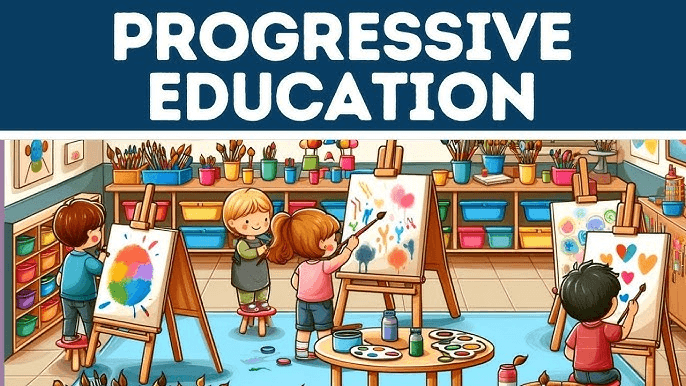Top Schools in India That Follow a Progressive Education Approach
In today’s rapidly changing world, education is no longer about cramming textbooks or acing standardized exams. It’s about creative learning, emotional intelligence, adaptability, and the ability to work in teams. Parents are now exploring alternative schools that offer a progressive education—where curiosity is celebrated, mistakes are learning opportunities, and collaboration thrives.
India, with its rich educational history, is embracing this shift. Several schools are breaking away from conventional models to prioritize collaborative learning, child-led exploration, and value-based education. Let’s explore India’s top schools that embody these ideals, and see how they’re reshaping the future of learning.
Why Choose Progressive Education?
Moves beyond rote learning to skill-based, exploratory methods
Focuses on emotional growth, mindfulness, and well-being
Builds confident, creative problem-solvers
Encourages a love for lifelong learning
Creates safe spaces for collaboration and expression
Key Features of Progressive Education
Student-Centered Classrooms: Teachers act as facilitators, guiding learners without dominating the process.
Creative Learning Tools: Art, storytelling, and hands-on experiments become part of daily lessons.
Collaborative Learning: Peer interactions and team projects form a core learning strategy.
Flexible Curriculum: Learning is often project-based and interdisciplinary.
Values and Empathy: Emphasis on kindness, integrity, and holistic growth.
Top Schools in India That Follow a Progressive Education Approach
SSRVM (Sri Sri Ravishankar Vidya Mandir)
Blends traditional Indian values with modern education
Daily yoga, meditation, and breathing techniques
Balanced focus on academics, arts, and emotional intelligence
Rooted in progressive education ideals and spiritual well-being
The Valley School, Bengaluru
Part of the Krishnamurti Foundation India (KFI)
Students learn in serene, natural settings
No exams until higher grades, minimal homework
Prioritizes reflective dialogue and collaborative learning
Rishi Valley School, Andhra Pradesh
Also under KFI
Focus on rural development, nature, and sustainability
Multi-grade classrooms promote peer teaching
Strong emphasis on creative learning methods like music and craft
Mirambika – Free Progress School, New Delhi
Based on Integral Education by Sri Aurobindo
No rigid subjects or grades
Children learn through exploration, self-discovery, and inner growth
Celebrates uniqueness and promotes inner freedom
The Learning Community at Quest, Bengaluru
Small class sizes, child-led curriculum
Focus on real-world problem-solving
Rich integration of arts, environment, and storytelling
Encourages collaborative learning through community engagement
Sanskriti School, Pune
Emphasizes inclusive education and thematic learning
Teachers design creative, interdisciplinary modules
Regular use of drama, dance, and visual art in lessons
Builds emotional intelligence alongside academic growth
Sadhana Forest School, Auroville
Eco-conscious and off-grid learning environment
Students learn through nature walks, gardening, and hands-on work
Promotes empathy, sustainability, and creative learning
Centre for Learning, Bengaluru
No textbooks or standard assessments
Encourages questioning and open-ended inquiry
Deeply values dialogue, ethics, and self-reflection
Students design their own learning paths
Ukti – The School, Hyderabad
Follows the Multiple Intelligences model
Parents are active collaborators in the learning process
Focus on life skills, social behavior, and mental health
Projects are designed for group-based problem solving
Shibumi, Bengaluru
Another KFI-inspired school
Emphasizes awareness, observation, and self-understanding
Learning happens in mixed-age groups
Encourages trust, respect, and simplicity
Creative Learning: The Heart of Progressive Education
Creative learning is not a separate subject—it's a mindset. Here’s how top schools implement it:
Storytelling in History and Language: Students learn through tales and dramatizations
Visual Arts in Science: Diagrams, models, and artwork explain complex ideas
Music and Rhythm in Math: Patterns and sequences taught through music
Gardening in Biology: Students grow plants to learn ecosystems
Imaginative Writing: Journal prompts and poetry stimulate self-expression
These methods make abstract concepts tangible and boost retention.
Collaborative Learning: Building Team Spirit and Empathy
Instead of competition, progressive schools focus on collaborative learning where:
Students work in groups to solve problems
Discussions and peer reviews replace solo assignments
Debates, circle time, and group games foster expression
Emotional intelligence is nurtured through team feedback
Conflict resolution is taught as a life skill
This leads to well-rounded individuals who work well in teams and care for others’ perspectives.
FAQs
What exactly is progressive education?
Progressive education is a learning model that focuses on experiential, student-led, and socially integrated teaching approaches.
Are progressive schools recognized by education boards?
Yes. Many of them follow CBSE, ICSE, or international boards while using progressive methodologies.
How does collaborative learning benefit my child?
It builds communication skills, empathy, and teamwork—essential for personal and professional life.
Will my child fall behind academically in such schools?
Not at all. In fact, they often excel because they understand concepts deeply rather than memorizing facts.
Do these schools use technology in classrooms?
Yes, selectively and purposefully. Tech is used to enhance, not dominate, learning.
How do progressive schools discipline students?
Through dialogue, reflection, and natural consequences—not punishment.
Conclusion
The world doesn’t need more test-takers. It needs thinkers, creators, and compassionate citizens. The schools listed above champion a progressive education philosophy where learning is joyful, meaningful, and deeply human. Through creative learning tools and collaborative learning techniques, they’re shaping not just smart students—but fulfilled individuals.
So if you’re seeking a school where your child can blossom intellectually, emotionally, and ethically—these schools are your calling.

